Adding a calculator to your WordPress website can transform how visitors interact with your business. Calculators offer direct value to users while helping you gather leads and showcase your expertise. Finding the right calculator plugin is key to providing this enhanced functionality without sacrificing site performance.
As a web design and development agency specializing in WordPress solutions, we’ve helped businesses implement various calculation tools on their websites. The right plugin not only adds powerful functionality but also creates engaging user experiences that increase conversion rates and customer satisfaction.
In this guide, we’ll examine the best WordPress calculator plugins available today, highlight their key features, and help you select the perfect option for your specific business requirements.
Why Your Business Website Needs a Calculator Plugin
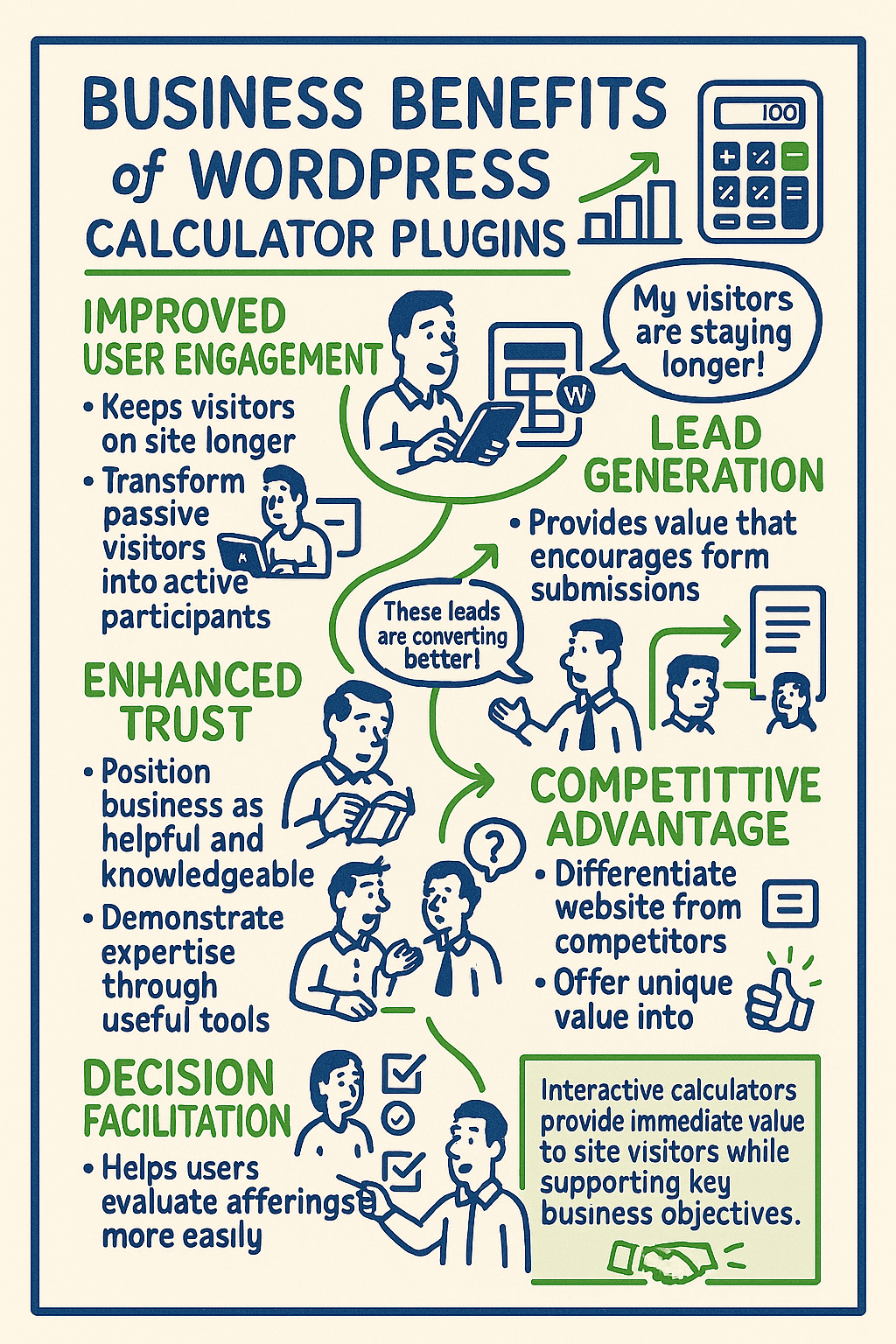
Calculator tools are no longer just nice-to-have website features. They’ve become powerful assets that drive engagement, build credibility, and generate qualified leads. For business websites, calculators transform passive visitors into active participants.
When implemented correctly, calculator plugins provide immediate value to your site visitors. They allow users to perform calculations relevant to your products or services without leaving your website. This interaction increases time spent on your site and helps visitors make informed decisions.
Here are some key benefits of adding calculator functionality to your WordPress business website:
- Improved user engagement – Interactive elements keep visitors on your site longer
- Lead generation – Calculators provide value that encourages form submissions
- Enhanced trust – Useful tools position your business as helpful and knowledgeable
- Decision facilitation – Calculations help users evaluate your offerings more easily
- Competitive advantage – Custom calculators differentiate your website from competitors
Enhancing User Experience with Interactive Calculators
An effective calculator provides an interactive experience that engages users more deeply than static content. When visitors can input their specific information and receive personalized results, they become active participants in your site experience rather than passive readers.
Consider how a mortgage broker might implement a loan calculator. Rather than just listing interest rates, they allow potential clients to input loan amounts, terms, and down payments to see exact monthly payments. This level of personalization creates a more relevant and engaging experience.
The right calculator plugin transforms complex decisions into simple, user-friendly processes. This reduction in complexity makes your visitors more likely to take the next step in their customer journey.
Calculator Types for Different Business Needs
Calculator plugins are versatile tools that serve many business functions. The type of calculator you choose should align with your specific industry and business goals.
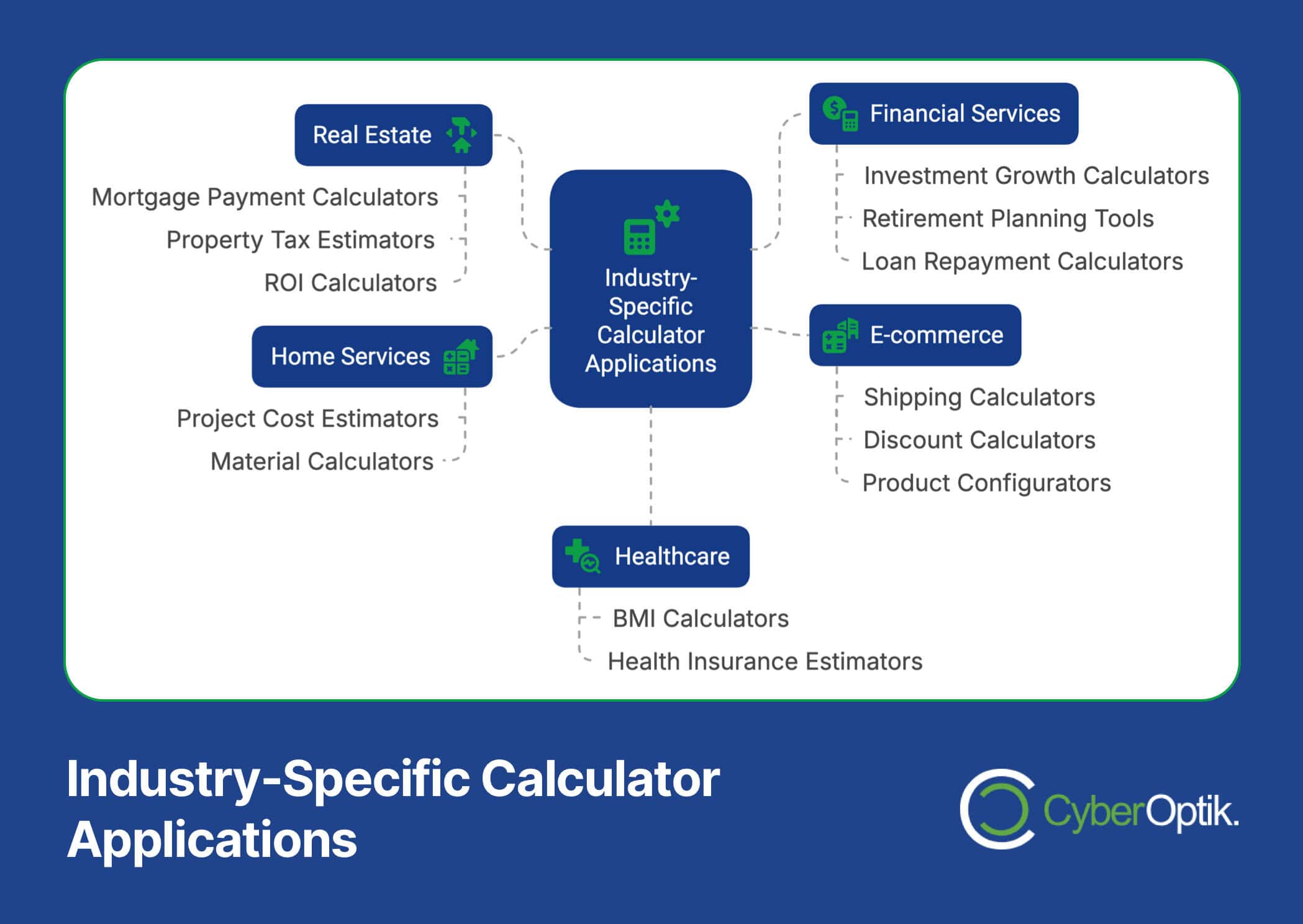
Different industries benefit from specific calculator types. Let’s look at some examples of how various businesses can leverage calculator plugins effectively:
| Business Type | Calculator Use Case | Business Benefit |
|---|---|---|
| Real Estate | Mortgage payment, property tax, ROI calculators | Helps clients visualize affordability and investment value |
| Financial Services | Investment growth, retirement planning, loan repayment | Demonstrates long-term value of financial products |
| Home Services | Project cost estimators, material calculators | Provides transparent pricing information to prospects |
| Healthcare | BMI calculators, health insurance estimators | Engages patients with interactive health assessments |
| E-commerce | Shipping calculators, discount calculators, product configurators | Reduces cart abandonment by providing cost clarity |
The table above shows how calculator plugins can be tailored to suit various business models. Each calculator type addresses specific customer needs while supporting key business objectives.
Top WordPress Calculator Plugins for Business Websites
After evaluating numerous WordPress calculator plugins, we’ve identified the top options that offer the best combination of features, usability, and value. Each of these solutions has distinct strengths that make them suitable for different business scenarios.
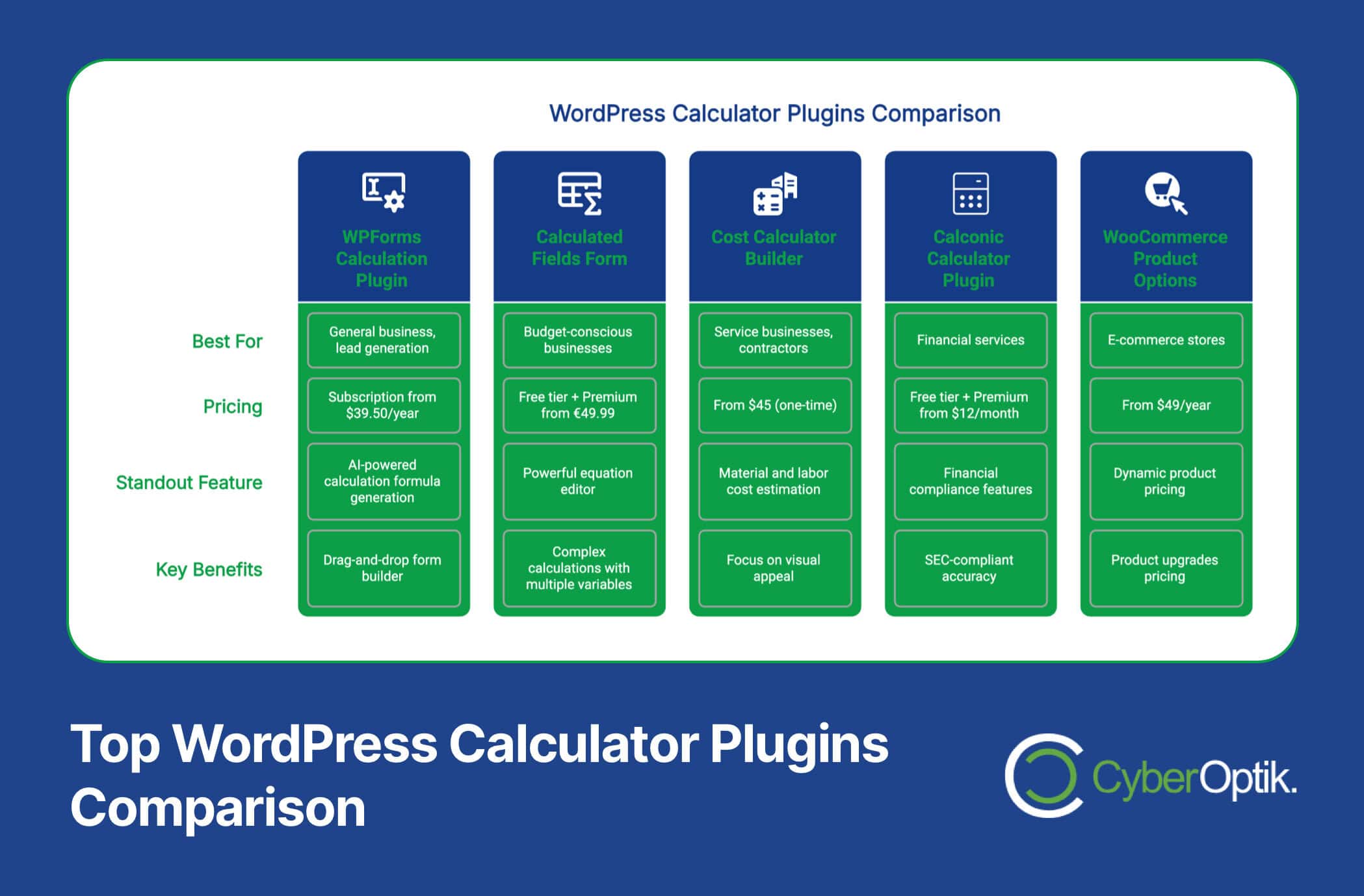
WPForms Calculation Plugin
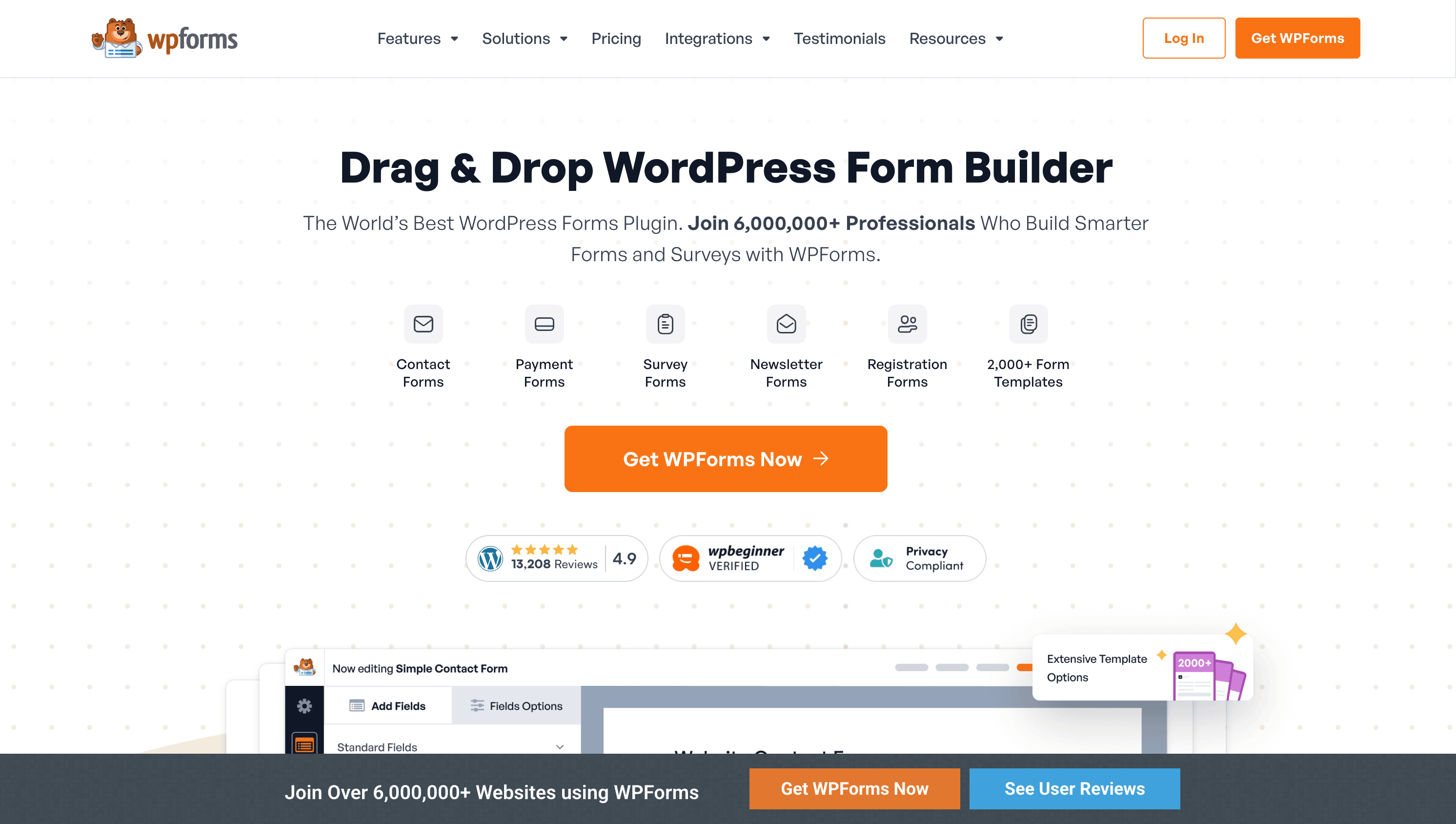
WPForms stands out as a leading form builder with powerful calculation capabilities. The WPForms Calculations addon transforms their already robust form builder into a versatile calculator tool. Their calculation feature allows automatic formula generation based on natural language descriptions. (Source: WPForms)
Key features of the WPForms calculator include:
- Drag-and-drop form builder with calculation fields
- Access to 2,000+ pre-built templates including mortgage calculators and order forms
- Support for 18+ advanced math functions including logarithms and conditional logic
- Conditional logic to create dynamic calculators
- Seamless integration with other form elements
Recent updates have improved the WPForms calculator significantly, with 47% faster calculation speeds compared to previous versions, achieved through optimized JavaScript engines. (Source: WPForms)
WPForms excels in security, encrypting all calculation inputs and results using TLS 1.3 protocols, meeting GDPR standards. (Source: WPForms) This makes it an excellent choice for businesses handling sensitive financial information.
Calculated Fields Form
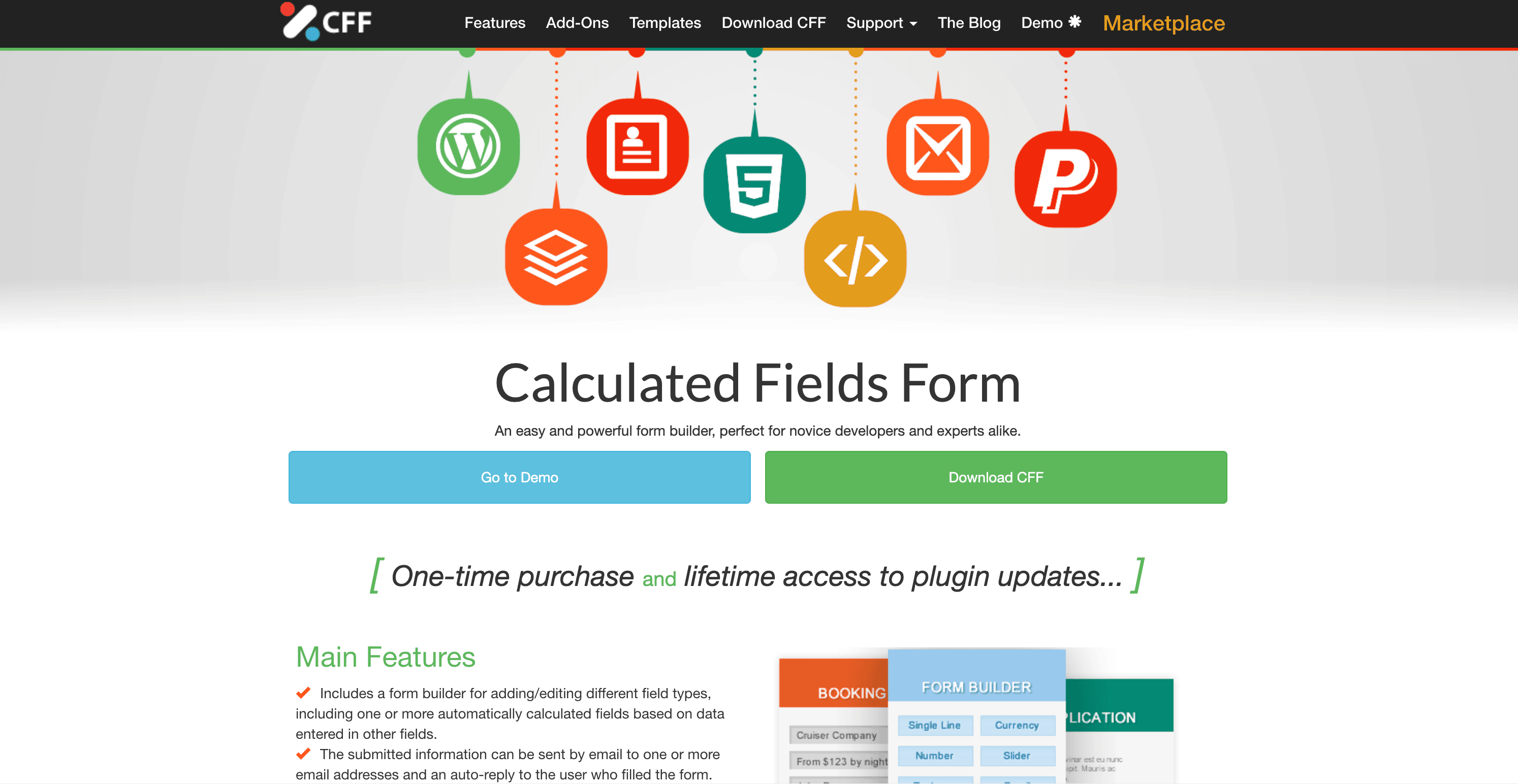
Calculated Fields Form offers an accessible entry point for businesses looking to implement calculator functionality. It provides a free tier with basic arithmetic operations, while premium plans start at €49.99 per site. (Source: WPForms)
This plugin is known for its flexibility and powerful equation editor. It allows for complex calculations with multiple variables and conditional logic, making it suitable for sophisticated business applications.
The visual form editor makes it easy to design calculator forms without coding knowledge. While not as polished as some premium alternatives, Calculated Fields Form offers good value, especially for smaller businesses or those testing calculator functionality.
Cost Calculator Builder by Stylemix Themes
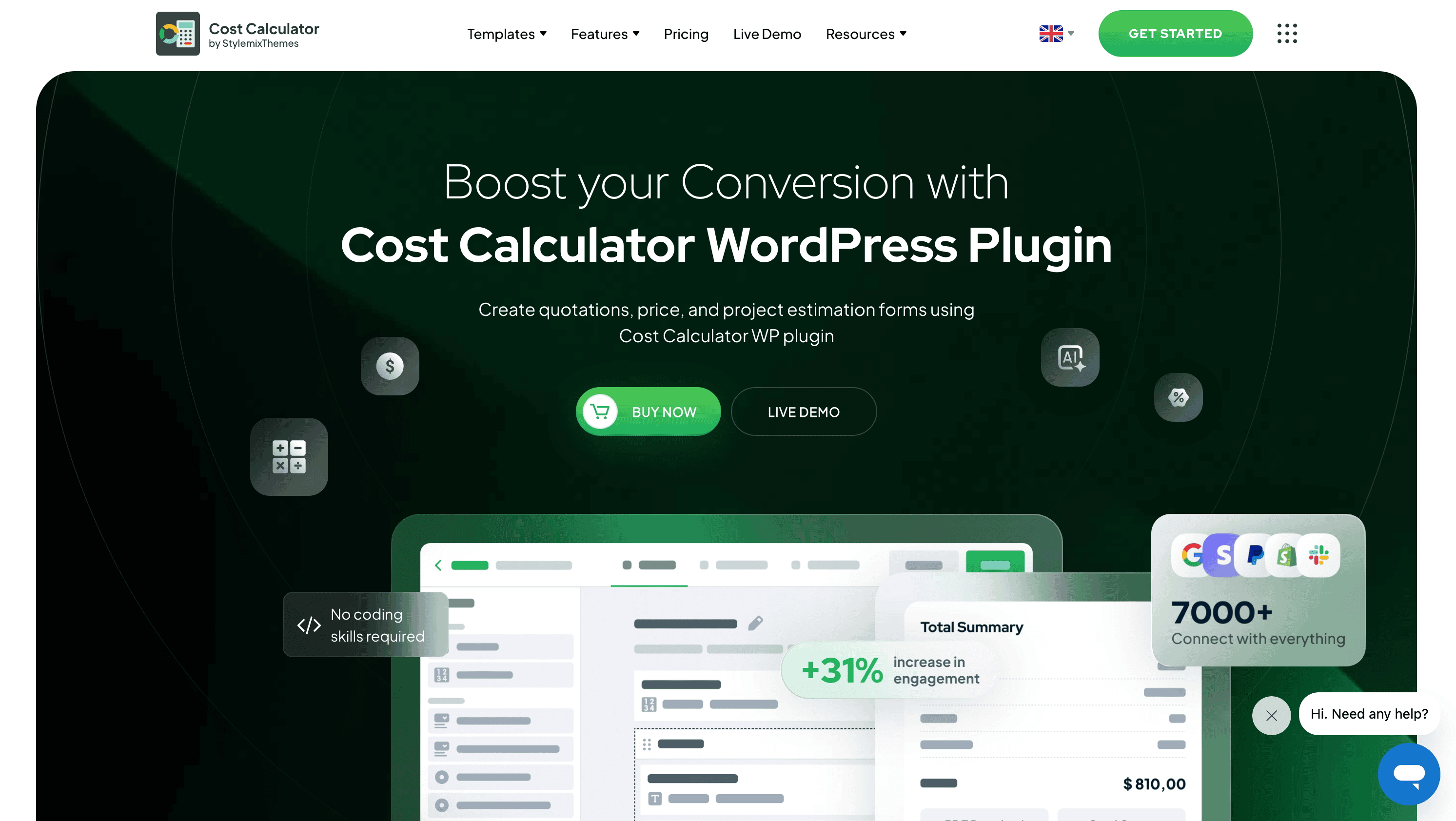
For service-based businesses, Cost Calculator Builder by Stylemix Themes offers specialized functionality. This plugin focuses on helping service providers create detailed estimates with customizable hourly rates and material cost calculations. (Source: WPForms)
What sets this plugin apart is its focus on visual appeal and user experience. The calculator forms are highly customizable with modern designs that integrate well with most WordPress themes. This makes it particularly suitable for businesses where visual presentation matters.
The drag-and-drop builder allows for easy creation of professional-looking calculators without coding knowledge. While primarily designed for service businesses, its flexibility makes it suitable for various calculator applications.
Calconic Calculator Plugin
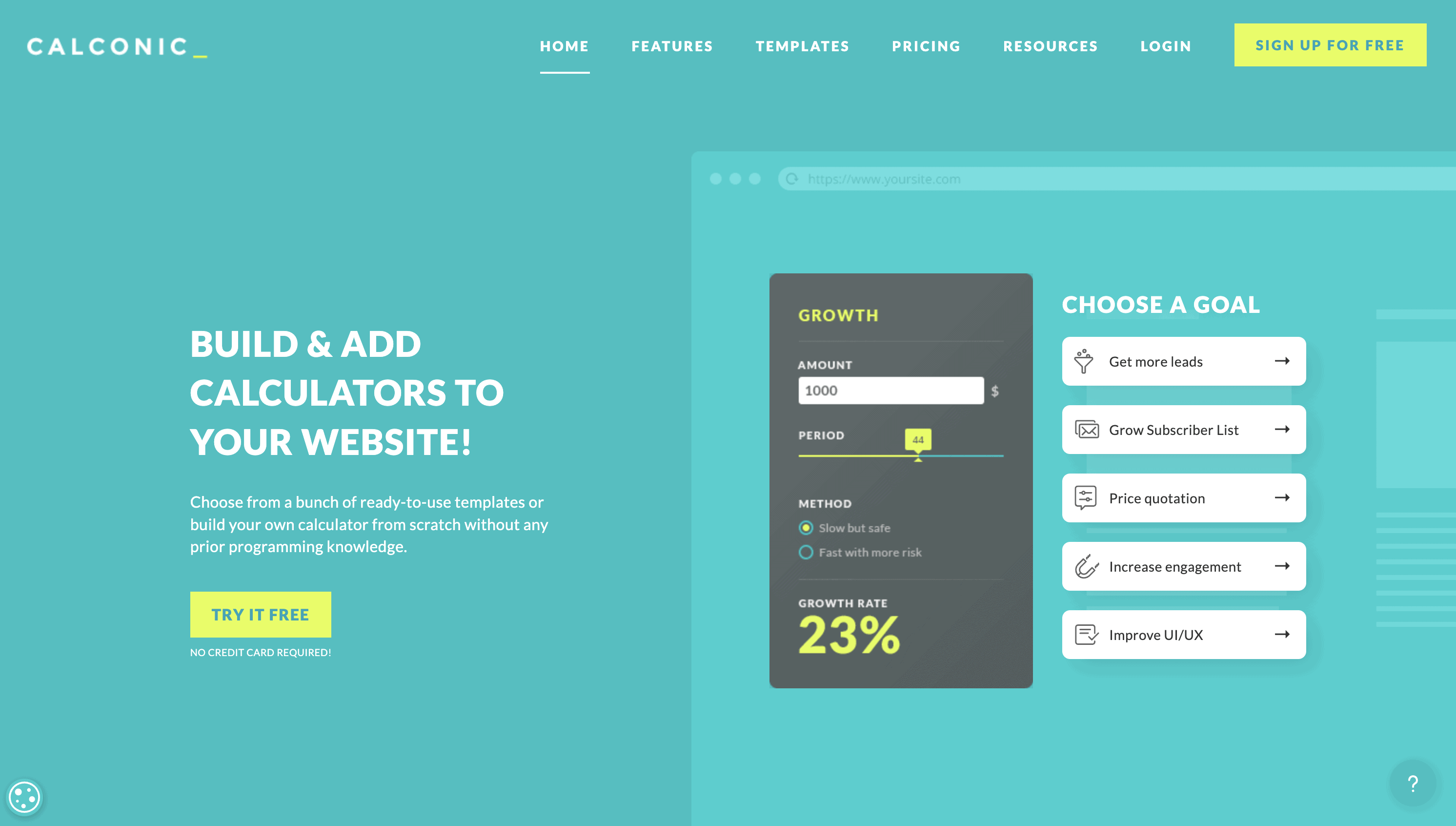
Calconic stands out for financial service businesses that need specialized calculation tools. This plugin handles compound interest calculations with SEC-compliant accuracy, making it ideal for financial advisors, insurance agents, and investment firms. (Source: WPForms)
The plugin features a modern interface with responsive designs that work well on all devices. Its template library includes many financial calculators that can be customized to match your branding.
Calconic also offers integration with popular CRM systems, allowing you to capture leads directly from calculator submissions. This feature is particularly valuable for businesses using calculators as part of their lead generation strategy.
WooCommerce Product Options
For e-commerce businesses, WooCommerce Product Options enables dynamic pricing based on user selections. This specialized calculator allows for product upgrades or quantity discounts that automatically update the price. (Source: WPForms)
This plugin is specifically designed to enhance e-commerce websites by adding product configuration options that affect pricing. While not a standalone calculator plugin, it provides essential calculation functionality for online stores.
Integration with WooCommerce is seamless, making it easy to implement complex pricing structures for configurable products. For businesses selling customizable products or services, this plugin can significantly enhance the purchase experience.
| Plugin | Best For | Pricing Model | Standout Feature |
|---|---|---|---|
| WPForms | General business use, lead generation | Subscription from $39.50/year | AI-powered calculation formula generation |
| Calculated Fields Form | Budget-conscious businesses | Free tier + Premium from €49.99 | Powerful equation editor |
| Cost Calculator Builder | Service businesses, contractors | From $45 one-time | Material and labor cost estimation |
| Calconic | Financial services | Free tier + Premium from $12/month | Financial compliance features |
| WooCommerce Product Options | E-commerce stores | From $49/year | Dynamic product pricing |
This comparison table highlights the key differences between the top calculator plugins. Your choice will depend on your specific business needs, budget, and technical requirements.
Key Features to Look for in WordPress Calculator Plugins
When selecting a calculator plugin for your WordPress site, certain features are essential for ensuring functionality, user experience, and business value. Knowing what to look for helps you make an informed decision that aligns with your specific requirements.
Formula Building and Mathematical Functions
The mathematical capabilities of your calculator plugin determine what kinds of calculations you can offer. Basic plugins support simple arithmetic operations, while advanced options include complex mathematical functions.
Look for plugins that support the specific calculations your business needs. For example, WPForms Calculations Addon supports 18+ advanced math functions including logarithms and conditional logic, released March 2025. (Source: WPForms)
The ability to create custom formulas is particularly important for specialized business calculations. Some plugins offer visual formula builders, while others require manual formula entry. Choose a solution that matches your technical comfort level and calculation needs.
Mobile Responsiveness and Design
Mobile compatibility is crucial for any website element today. This is especially true for calculators, where users need to input data and view results on smaller screens.
A striking 93% of users cite mobile responsiveness as their top concern when choosing calculator plugins, addressed by WPForms’ responsive design framework. (Source: WPForms) This statistic highlights the importance of selecting a plugin that performs well across all devices.
Look for plugins that offer responsive designs out of the box. The calculator should automatically adjust to different screen sizes without requiring separate mobile configuration. Test any plugin you’re considering on multiple devices before making a final decision.
Form Integration Capabilities
Most business calculators need to capture user information alongside calculation inputs. This makes form integration a critical feature to consider.
The best calculator plugins seamlessly combine calculation fields with form elements like name, email, and phone number fields. This integration allows you to capture leads while providing value through your calculator.
Consider how the calculator data will be stored and processed. Look for plugins that integrate with your existing CRM or email marketing platform to streamline lead management.
Data Security and Compliance
Security is essential when collecting user information through calculator forms. This is especially true for financial calculators or those handling sensitive personal information.
Premium calculator plugins like WPForms use robust security measures. WPForms encrypts all calculation inputs and results using TLS 1.3 protocols, meeting GDPR standards. (Source: WPForms)
When evaluating plugins, look for GDPR compliance features, secure data transmission, and proper data storage practices. These security measures protect both your users and your business from potential data breaches.
Support and Documentation
Even the best calculator plugins may require some assistance during setup or when creating complex calculations. Good technical support and documentation can make this process much smoother.
Premium plugins typically offer dedicated support channels, comprehensive documentation, and tutorial resources. This support can be invaluable when implementing advanced calculator functionality.
Before choosing a plugin, review its support options, documentation quality, and update frequency. A well-maintained plugin with active support provides better long-term value for your business.
How to Choose the Right Calculator Plugin for Your Business
With several quality options available, selecting the right calculator plugin requires careful consideration of your specific business needs, technical requirements, and budget constraints.
Assessing Your Business Requirements
Start by clearly defining what you want your calculator to achieve. Are you mainly focused on lead generation, customer education, or simplifying product configuration? Your primary goal will guide many of your decisions.
Consider these questions when defining your requirements:
- What specific calculations will your users need to perform?
- How complex are the formulas required for these calculations?
- Will you need to collect user information alongside calculator inputs?
- How will the calculator integrate with your existing business processes?
- What volume of calculator submissions do you expect to handle?
Document your answers to create a clear set of requirements. This will serve as your checklist when evaluating different plugin options.
Comparing Plugin Performance
Website loading speed affects user experience and conversion rates. Calculator plugins that use heavy scripts can slow down your site, potentially driving visitors away.
Performance should be a key consideration when selecting a calculator plugin. Recent updates to leading plugins have addressed this concern, with WPForms showing 47% faster calculation speeds compared to previous versions, achieved through optimized JavaScript engines. (Source: WPForms)
To evaluate performance, test plugins in a staging environment before implementing them on your live site. Monitor load times and server resource usage to ensure the plugin won’t negatively impact your overall site performance.
| Performance Factor | Why It Matters | What to Look For |
|---|---|---|
| Code Quality | Affects page load speed and server resources | Well-optimized JavaScript, minimal DOM manipulation |
| Loading Strategy | Determines when calculator scripts load | Conditional loading only on pages with calculators |
| AJAX Implementation | Affects calculation speed and user experience | Real-time calculations without page reloads |
| Asset Size | Larger files take longer to download | Minimized CSS/JS files, optimized dependencies |
| Caching Compatibility | Ensures calculator works with caching plugins | Proper cache exclusions or cache-compatible code |
The table above highlights key performance factors to consider when evaluating calculator plugins. Prioritizing these aspects will help ensure your calculator enhances rather than hinders user experience.
Evaluating Cost vs. Value
Calculator plugins range from free options with basic functionality to premium solutions with advanced features. The right choice depends on your specific needs and budget constraints.
Free plugins like the basic version of Calculated Fields Form can be good starting points. This plugin provides a free tier with basic arithmetic operations, while premium plans start at €49.99 per site for more advanced features. (Source: WPForms)
When evaluating cost, consider the total value rather than just the price tag. A premium plugin that saves development time, provides better user experience, and generates more leads may offer better ROI despite the higher initial cost.
Many premium plugins offer tiered pricing based on features and the number of sites. Choose a plan that aligns with your current needs but consider how your requirements might evolve as your business grows.
Implementation Considerations
Even the best calculator plugin will require proper implementation to deliver value. Consider the technical aspects of adding a calculator to your WordPress site before making your final decision.
If you’re asking what plugins should I use with WordPress, calculator plugins require careful consideration of how they’ll work with your existing website setup. Factors like theme compatibility, potential conflicts with other plugins, and integration requirements should be evaluated.
Some calculator plugins may require additional configuration or custom CSS to match your site’s design. Factor this implementation work into your decision-making process, especially if you have limited technical resources.
Getting the Most from Your WordPress Calculator Plugin
Once you’ve selected and installed a calculator plugin, the next step is optimizing its implementation to maximize business value. Strategic placement, thoughtful design, and proper integration are key to calculator success.
Best Practices for Calculator Implementation
Implementing a calculator effectively requires planning and attention to user experience details. Follow these steps to ensure your calculator delivers maximum value:
- Start with clear user instructions – Explain what the calculator does and how to use it
- Minimize input fields – Ask for only essential information to reduce friction
- Provide default values – Help users understand expected input formats
- Display results clearly – Use visual elements to highlight calculation outputs
- Include relevant context – Help users interpret what the results mean for them
Strategic placement of your calculator can significantly impact its effectiveness. Consider placing calculators on service pages, pricing pages, or as standalone landing pages depending on your business goals.
Always test your calculator with real users before full implementation. Gather feedback on usability and make adjustments to improve the user experience.
Common Calculator Use Cases by Industry
Different industries can leverage calculator plugins in unique ways. Understanding industry-specific applications can help you implement the most effective calculator for your business.
| Industry | Calculator Type | Implementation Example |
|---|---|---|
| Financial Services | Retirement calculator | Helps clients visualize savings growth based on contribution amounts and time horizon |
| Real Estate | Mortgage affordability calculator | Allows prospects to determine home budgets based on income and existing debt |
| Healthcare | BMI or nutrition calculator | Provides health assessments that lead into service recommendations |
| Construction | Material estimator | Helps customers budget for projects by calculating material quantities needed |
| Marketing Agencies | ROI calculator | Demonstrates potential return on investment from marketing services |
The examples above show how calculators can be tailored to specific industry needs. By focusing on calculations that directly relate to your offerings, you create tools that naturally lead users toward your services.
Testing and Optimizing Your Calculator Forms
Like any lead generation tool, calculator forms should be continuously tested and optimized. Small changes can often lead to significant improvements in usage and conversion rates.
Start by establishing baseline metrics for your calculator. Track usage statistics, completion rates, and conversion rates from calculator users. These metrics will help you measure the impact of any changes you make.
Consider A/B testing different aspects of your calculator:
- Form layout and design
- Number and type of input fields
- Default values and input formats
- Results presentation and follow-up CTAs
- Calculator placement on your website
Use the data from these tests to continuously refine your calculator implementation. Even small improvements can deliver significant business value over time.
How We Can Help Implement Calculator Plugins for Your Business
Implementing a calculator plugin effectively often requires technical expertise. As a custom WordPress web design agency, we specialize in implementing advanced functionality like calculator plugins for business websites.
Our team has experience integrating various calculator solutions into WordPress sites across multiple industries. We handle everything from plugin selection and installation to custom configuration and design integration.
When implementing calculator plugins, we focus on:
- Strategic placement – Positioning calculators where they’ll drive maximum engagement
- Custom styling – Ensuring calculators match your brand aesthetic perfectly
- Performance optimization – Implementing calculators without slowing down your site
- Lead capture integration – Connecting calculator submissions to your CRM or email systems
- Testing and refinement – Ensuring calculators work flawlessly across all devices
If you’re considering adding a calculator to your WordPress website, we can help you select the right plugin and implement it effectively. Contact us to discuss how a customized calculator solution can benefit your specific business needs.
Conclusion
WordPress calculator plugins offer powerful ways to enhance your business website. They provide immediate value to users while helping you generate qualified leads and showcase your expertise. Finding the right calculator plugin requires careful consideration of your business requirements, technical needs, and budget constraints.
The best calculator plugins combine ease of use with powerful functionality. WPForms, Calculated Fields Form, Cost Calculator Builder, Calconic, and WooCommerce Product Options each offer unique strengths for different business scenarios. By understanding the key features and implementation best practices, you can select a solution that delivers maximum value for your business.
Remember that successful calculator implementation goes beyond plugin selection. Strategic placement, thoughtful design, and proper integration are essential for achieving your business goals. With the right approach, a calculator can become one of the most valuable assets on your WordPress website.
Need help implementing a calculator on your WordPress site? Contact our team to discuss your specific requirements and how we can help you create an effective calculator solution for your business.




